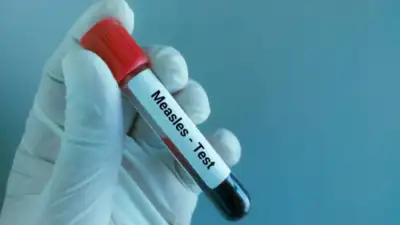ARTICLE AD BOX

Dallas has confirmed the first case of measles. The resident is a woman in her mid-20s who was fully vaccinated, CBS News reported citing the Dallas County Health and Human Services."The woman was contagious from May 30 through June 7. DCHHS said she has received care and officials are working to identify and notify individuals who may have been exposed," the media reported. Possible measle exposure locations are said to be Lemma Coffee Plano, 1023 E 15th St, Plano, TX, 75074; and First Baptist Plano, 3665 W President George Bush Hwy, Plano, TX, 75075.
Measles has made a comeback
Measles might sound like one of those “old-timey” diseases that only existed in history books, but trust me, it’s still very much around—and it’s not something to take lightly.
Caused by a highly contagious virus, measles spreads quickly. One sneeze or cough from an infected person can hang in the air or land on surfaces, ready to infect the next unsuspecting soul who walks by.
So, what are the symptoms of measles?
At first, it might seem like you just have a regular flu—fever, cough, runny nose, and red eyes. But then comes the telltale sign: a red, blotchy rash that usually starts on the face and then travels down the body. Before that rash shows up, you might even notice tiny white spots inside your mouth (called Koplik spots).
Once the rash appears, it usually sticks around for about a week, making you look and feel like you've had the roughest week ever.Measles isn’t just uncomfortable—it can be dangerous. Especially for babies, pregnant women, and people with weak immune systems. Complications can range from ear infections and diarrhea to pneumonia and even brain swelling (encephalitis). In severe cases, it can be fatal.The real kicker? Measles is totally preventable.
One or two doses of the MMR vaccine (measles, mumps, and rubella) can give lifelong protection. Yet, outbreaks still happen, especially when vaccination rates drop. Some people skip vaccines due to misinformation or fear, but the science is pretty clear: the vaccine is safe, effective, and the best way to protect not just yourself, but everyone around you.Once someone catches measles, there's no specific cure. Doctors usually just treat the symptoms—fluids, rest, and fever-reducing meds.
But prevention really is the best medicine here.
Why do vaccinated individuals get measles?
Sometimes people still get measles even after getting vaccinated, and it usually boils down to one of two things: either their body didn’t build full immunity from the vaccine, or they didn’t get both doses. The first dose gives about 93% protection, but the second bumps it up to around 97%. So if someone skipped the second shot, they're more at risk. Also, a tiny percent of people just don’t respond to the vaccine for whatever reason—immune systems can be quirky like that.
But here’s the good news: even if vaccinated folks do catch it, the symptoms are usually way milder.So, while measles might seem like a thing of the past, it’s not something to ignore. It’s a fast-spreading, potentially dangerous virus that can mess up your week—or worse. Getting vaccinated, staying alert for symptoms, and acting fast if someone in your circle falls sick can make all the difference. Because nobody wants a virus that enters like a ninja, messes up your system, and leaves a rashy trail behind.



.png)
.png)
.png)
















 20 hours ago
3
20 hours ago
3









 English (US) ·
English (US) ·